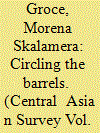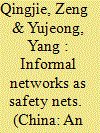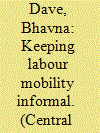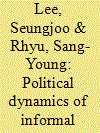| Srl | Item |
| 1 |
ID:
174886


|
|
|
|
|
| Summary/Abstract |
Most of Kazakhstan’s wealth hinges on oil rents, and the overall performance of the economy is closely linked to petroleum’s price fluctuations. This study asks (1) why the institution of private ownership of oil proceeds has not led to a positive transformation of patron–client relations embedded in the country’s energy sector, thus challenging the relevance of the ‘private ownership’ narrative, and (2) why the collapse in the price of oil did not affect the stability and essential character of the regime in power. To answer these questions, the article examines two case studies: the privatization of the oil sector in the 1990s, and the post-2014 oil crisis. Thus the article problematizes important theories on oil-sector privatization and contributes to recent work on regime stability as it pertains to the resource curse. The analysis of the constitutive impact of oil wealth on Kazakh politics generates wider insights on the links between the power of informal networks and regime stability in petrostates through boom and bust cycles.
|
|
|
|
|
|
|
|
|
|
|
|
|
|
|
|
| 2 |
ID:
073789


|
|
|
| 3 |
ID:
155932


|
|
|
|
|
| Summary/Abstract |
The current Chinese leadership that assumed power in late 2012 has launched an anti-corruption campaign that is unprecedented in magnitude. The sheer number of high-level officials cracked down by the Communist Party’s disciplinary body prompts a much speculated question in China studies: how do the dynamics of informal networks affect the Party’s disciplinary punishment of senior cadres? This article initiates the answering of this question with systematic evidence. The authors highlight the threat of rectification campaigns hanging over the bureaucratic system and thus inducing officials to attach themselves to powerful patrons whose protection offers pivotal career security for lower-level clients. Based on the authors’ findings from a sample of over 500 provincial officials in office when the current campaign started, those tied to incumbent members of the Politburo Standing Committee were less likely to be investigated for corruption than those without such ties. Factional ties with retired members of the same body, however, did not provide similar protection. The authors’ analysis helps explain the pervasiveness of personal dependence and factional activities in China’s political system and also sheds light on the complex interaction of informal rules and formal institutions in authoritarian regimes.
|
|
|
|
|
|
|
|
|
|
|
|
|
|
|
|
| 4 |
ID:
134372


|
|
|
|
|
| Summary/Abstract |
Kazakhstan's legal–regulatory framework provides for a small number of quotas for highly skilled foreign workers but has no provisions for legal employment of semi-skilled or low-skilled migrants from the Central Asian states, who enter under the Commonwealth of Independent States (CIS) visa-free regime and work informally in construction, household and service sectors. The lack of acknowledgement of the scale of informal labour migration has denoted an act of strategic neglect on the part of the state, allowing it to render migrant labour illegal, disposable, and keep migrants legally and statistically invisible. Unable to obtain a legal status, migrants nominally comply with the existing legal framework as they also circumvent and subvert it. The article details the entrenched informal regime of labour migration and explains why recent efforts to ‘legalize’ labour through the introduction of a labour patent (licence), as is the case in Russia, are unlikely to bring in significant reforms.
|
|
|
|
|
|
|
|
|
|
|
|
|
|
|
|
| 5 |
ID:
122792


|
|
|
|
|
| Publication |
2013.
|
| Summary/Abstract |
As opposed to the current literature which argues that informal politics pervades formal institutions in Kazakhstan and Central Asia more widely, this article argues that Nur Otan, the political party of the President of Kazakhstan, acts as a formal institution to counter the instability generated by informal networks competing for access to political and economic resources. This is achieved by consolidating the political parties associated with these networks into Nur Otan and the synchronisation of the party and the state apparatus. However, the extent to which Nur Otan can provide this stabilising function in the long term is dependent upon regime dynamics.
|
|
|
|
|
|
|
|
|
|
|
|
|
|
|
|
| 6 |
ID:
080626


|
|
|
|
|
| Publication |
2008.
|
| Summary/Abstract |
Dense informal networks between public- and private-sector elites have long been identified as a key institutional feature that had underpinned rapid economic development in many East Asian countries. With the outbreak of the Asian financial crisis in 1997, however, a number of scholars have cast doubt on the long-term efficacy of informal networks, discrediting the East Asian model as crony capitalism. Although these debates renewed our interests in the role of informal networks in East Asia, they fall short of highlighting the real dynamics underlying informal networks. Parachute appointment in Korea - political appointment of ex-politicians and ex-bureaucrats into public and private corporations - is a prime example demonstrating political intervention in the formation and management of informal networks.We argue that the nature of political competition in Korea is a key to understanding the underlying dynamics of informal networks. First, Korean politicians, the president and the ruling party have actively engaged in making and maintaining the networks of parachute appointment. Second, owing to its politicized nature, parachute appointment is neither institutionalized nor stably managed. In the current highly uncertain political and economic situation, both public and private corporations have actively embraced parachute appointment as a means of fortifying external networking with the incoming political leadership
|
|
|
|
|
|
|
|
|
|
|
|
|
|
|
|